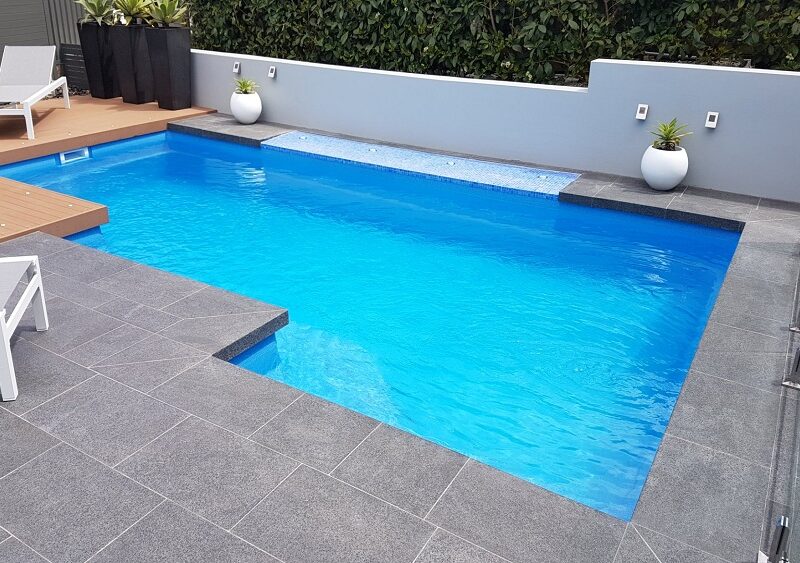When it comes to maintaining the cleanliness and safety of your fibreglass pool, there are lots of sanitisation options available. These methods serve to eliminate harmful bacteria and other potentially harmful microorganisms, ensuring a safe and pleasurable swim for everyone. In the following article, we’ll explore these options in detail, helping you make an informed decision on the most suitable sanitisation method for your fibreglass pool.
Different Sanitisation Options
There are primarily four popular options for sanitising your fibreglass pool:
Chlorine: Chlorine, the most traditional and widely employed sanitiser, is known for its exceptional ability to eliminate bacteria and algae in swimming pools. This versatile chemical is available in different forms, including liquid, tablet, and granular, providing users with flexible options to effectively maintain pool hygiene and cleanliness. With its reliable and time-tested properties, chlorine continues to be a popular choice for pool sanitisation.
The Pros and Cons of Chlorine
Pros:
Chlorine’s effectiveness in killing bacteria and preventing algae growth is unmatched. It’s widely available and relatively inexpensive, making it a practical choice for many pool owners. It’s also versatile, available in several forms, including liquid, tablets, and granules, which cater to a variety of pool sizes and types. Moreover, chlorine’s ability to maintain a long-lasting residual effect means it continues to sanitise the pool even after the initial treatment.
Cons:
On the downside, chlorine can cause skin and eye irritation in individuals with sensitive skin or allergies. It has a distinct, strong odour that some find unpleasant. Regular testing and adjustment of the pool’s chlorine levels are necessary to ensure they remain within the safe and effective range. Furthermore, chlorine’s effect on the environment is a concern to some, as it is not readily biodegradable.
Saltwater Systems: Saltwater systems, also known as salt chlorine generators, utilise a process called electrolysis to convert salt into chlorine. This chlorine is then used to effectively sanitise the pool water, ensuring a clean and safe swimming environment. These systems are often considered a gentler alternative to traditional chlorine-based systems, thanks to the lower concentration of chlorine produced. This lower concentration can be beneficial for individuals with sensitive skin or eyes, as it tends to be less harsh and irritating. By providing this added detail, it becomes clearer how saltwater systems offer a more comfortable and enjoyable swimming experience.
The Pros and Cons of Saltwater Systems
Pros:
Saltwater systems offer a less harsh swimming environment, which is ideal for individuals with sensitive skin or eyes. The water feels softer, and the foul odour often associated with traditional chlorine is notably absent. Moreover, saltwater systems are self-regulating, reducing the need for constant chemical testing and adjustments. Lastly, these systems tend to be more environmentally friendly, given that they utilise a natural resource (salt) and produce fewer harmful byproducts.
Cons:
Despite the advantages, there are a few drawbacks to consider with saltwater systems. First, the initial setup cost can be considerably higher than traditional chlorine systems. Maintenance can also be more expensive, as the cell that performs the electrolysis might need to be replaced every few years. Additionally, while the chlorine levels are generally gentler, they can still cause damage to certain types of pool equipment and finishes if not correctly managed. Lastly, although the system is largely self-regulating, occasional salt level tests are still recommended to ensure optimal performance.
UV Systems: These systems utilise ultraviolet light, a powerful tool that effectively eliminates bacteria and other harmful pathogens. By harnessing the power of UV light, these systems provide a safe and eco-friendly alternative, reducing the reliance on chemicals for disinfection purposes. This not only ensures a healthier environment but also contributes to sustainable practices.
The Pros and Cons of UV Systems
Pros:
UV Systems are a proven and effective method for eliminating a broad range of harmful bacteria and pathogens. They reduce the dependency on chemicals for pool sanitisation, resulting in a healthier swimming environment. UV systems also contribute to sustainability by decreasing chemical usage. Moreover, they require relatively low maintenance, as the UV bulb only needs to be replaced once every 1-3 years. Finally, unlike chlorine and saltwater systems, UV systems do not result in any harmful byproducts or associated odours.
Cons:
Despite their effectiveness, UV systems do not offer a residual sanitising effect. This means that while they kill bacteria and pathogens during their operation, they do not prevent the growth or reproduction of these organisms once the system is turned off. Furthermore, UV systems are only effective as long as the water is circulating through the system. Therefore, they are typically used in conjunction with another sanitisation method. Lastly, the initial investment for a UV system could be higher compared to traditional chlorination methods, though the lower running costs might offset this in the long run.
Mineral Systems
Mineral systems, often used in conjunction with another sanitisation method, introduce natural minerals into the pool water to inhibit algae growth and reduce the need for chlorine. These systems typically use a combination of silver and copper, minerals known for their antimicrobial properties. It’s worth noting, though, that while mineral systems aid in maintaining water quality, they’re not standalone solutions and often require a reduced amount of chlorine or another sanitiser to ensure complete pool sanitisation.
The Pros and Cons of Mineral Systems
Pros:
Mineral systems provide a gentle sanitisation option that is less likely to cause skin and eye irritation. They require fewer chemicals, leading to a more natural swimming experience and less maintenance. Additionally, because they use natural minerals, these systems are relatively environmentally-friendly.
Cons:
Mineral systems may not be as effective at eliminating certain types of bacteria and algae. They also typically need to be combined with a small amount of chlorine for the best results. Lastly, the cost of replacement mineral cartridges can add up over time.
Why Choose Fibreglass Pools Sydney To Install Your Fibreglass Pool?
When it comes to the installation of a fibreglass pool, choosing a local Sydney installer like Fibreglass Pools Sydney ensures you get a superior quality service. We specialise in durable, Australia made fibreglass pools, designed to withstand Sydney’s unique climate conditions. Our team is dedicated to delivering top-tier workmanship and unparalleled customer service. With Fibreglass Pools Sydney, you’re not just getting a pool; you’re investing in a quality product that will stand the test of time.
Conclusion
In conclusion, selecting the right sanitisation system for your pool is crucial for ensuring a healthy and enjoyable swimming environment. Whether you opt for a traditional chlorine system, a saltwater, UV, or mineral system, each comes with its unique set of benefits and drawbacks. At Fibreglass Pools Sydney, we’re committed to providing our customers with the best quality service and guidance to help them make an informed decision. Remember, a well-maintained pool isn’t just about cleanliness; it’s about enhancing the quality of your leisure time and the value of your home.











